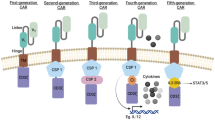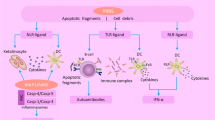Summary
Monoclonal antibodies (mAbs) have been used in a wide variety of autoimmune diseases, most particularly in rheumatoid arthritis and multiple sclerosis. Activation antigens (interleukin-2 receptor), pan-T cell antigens (CD2 and CD3), and T cell subset-specific antigens (CD4) are the most commonly recognised targets of mAbs.
The numerous pilot studies conducted have generally led to clinical improvement, although this is usually short-lasting. Dosages have varied from 5 to 100 mg/day and the duration of treatment from 7 to 14 days. Major adverse effects are generally only observed after the first infusion of anti-CD3 mAbs such as muromonab-CD3 (OKT-3). These effects are related to massive release of cytokines such as tumour necrosis factor-α, interferon-γ and interleukin-2.
Immunological modifications consisted of T cell depletion. After infusion of muromonab-CD3 a major but short-lived depletion of T cells is observed, followed by complete disappearance of CD3+ cells. A moderate depletion of CD4+ cells is observed after infusion of anti-CD4 mAbs. This depletion is more marked with chimaeric mAbs than with murine mAbs.
The occurrence of human antimurine antibodies is a major complication. These are generally of IgM or IgG isotype, but no serum sickness occurs. These antibodies may be anti-idiotypic and abrogate the therapeutic efficiency of mAbs. This problem can be circumvented by using chimaeric or humanised mAbs.
Randomised studies on a large scale are now needed to determine when mAbs should be used during the course of autoimmune disease, and which patients will benefit from this new therapy.
Similar content being viewed by others
References
Kohler G, Milstein C. Continuous cultures of fused cells secreting antibody of predefined specificity. Nature 1975; 256: 495–7
Cosimi AB, Burton RC, Colvin B, et al. Treatment of acute renal allograft rejection with OKT3 monoclonal antibody. Transplantation 1981; 32: 535–9
Waldor MD, Sriram S, Hardy R, et al. Reversal of experimental allergic encephalomyelitis with monoclonal antibody to a T-cell subset marker. Science 1985; 227: 415–7
Zamvil SS, Steinman L. The T lymphocyte in experimental allergic encephalomyelitis. Annu Rev Immunol 1990; 8: 579–621
van Lambalger R, Jonker M. Experimental allergic encephalomyelitis in rhesus monkeys. II. Treatment of EAE with anti-T lymphocyte subset monoclonal antibodies. Clin Exp Immunol 1987; 67: 305–412
Larsson P, Holmdahl R, Dencker L, et al. In vivo treatment with W3/13 (anti-pan T) but not with 0X8 (anti-suppressor/cytotoxic T) monoclonal antibodies impedes the development of adjuvant arthritis in rats. Immunology 1985; 56: 383–91
Range GE, Sriram S, Cooper SM. Prevention of type II collagen-induced arthritis by in vivo treatment with anti-L3T4. J Exp Med 1985; 162: 1105–10
Corkill MM, Kirkham BW, Dasgupta B, et al. New immunological measures of disease activity in rheumatoid arthritis: interleukin-6 and soluble interleukin-2 receptor levels in a 6 months trial. Clin Rheumatol 1990; 9: 139–48
Kyle V, Coughlan RJ, Tighe H, et al. Benefical effect of monoclonal antibody to interleukin-2 receptor on activated T-cells in rheumatoid arthritis. Ann Rheum Dis 1989; 48: 428–9
Kirkham B, Chikanza I, Pitzalis C, et al. Response to monoclonal CD7 antibody in rheumatoid arthritis. Lancet 1988; 1: 589
Kirkham BW, Thien F, Pelton BK. Chimeric CD7 monoclonal antibody therapy in rheumatoid arthritis. J Rheumatol 1992; 19: 11348–52
Strand V, Lipsky PE, Cannon G, et al. Effects of administration of an anti-CD5 plus immunoconjugate in rheumatoid arthritis. Arthritis Rheum 1993; 36: 620–30
Weinshenker BG, Bass B, Karlik S, et al. An open trial of OKT3 in patients with multiple sclerosis. Neurology 1991; 41: 1047–52
Hafler DA, Ritz J, Schlossman SF, et al. Anti-CD4 and anti-CD2 monoclonal antibody infusions in subjects with multiple sclerosis. J Immunol 1988; 141: 131–8
Hafler DA, Fallis RJ, Dawson DM, et al. Immunologic responses of progressive multiple sclerosis patients treated with an anti-T-cell monoclonal antibody, anti-T12. Neurology 1986; 36: 777–84
Herzog C, Walker C, Pichler WJ, et al. Monoclonal anti-CD4 in arthritis. Lancet 1987; 1: 1461–2
Horneff G, Burmester GR, Emmrich F, et al. Treatment of rheumatoid arthritis with an anti-CD4 monoclonal antibody. Arthritis Rheum 1991; 34: 129–39
Reiter C, Kakavand B, Rieber EP, et al. Treatment of rheumatoid arthritis with monoclonal CD4 antibody MT151. Arthritis Rheum 1991; 34: 525–36
Goldberg D, Morel P, Chatenoud L, et al. Immunological effects of high dose administration of anti-CD4 antibody in rheumatoid arthritis patients. J Autoimmunity 1991; 4: 617–30
Wendling D, Racadot E, Morel-Fourrier B, et al. Treatment of rheumatoid arthritis with anti-CD4 monoclonal antibody. Open study of 25 patients with the B-F5 clone. Clin Rheumatol 1992; 11: 1–6
Moreland LW, Bucy RP, Tilden A, et al. Use of a chimeric monoclonal anti-CD4 antibody in patients with refractory rheumatoid arthritis. Arthritis Rheum 1993; 36: 307–18
van der Lubbe PA, Reiter C, Breedveld FC. Chimeric CD4 monoclonal antibody cM-T412 as a therapeutic approach to rheumatoid arthritis. Arthritis Rheum 1993; 36: 1375–9
Hodgkinson S, Lindsley JW, Allegretta M, et al. Phase I study of chimeric anti-CD4 monoclonal antibody in multiple sclerosis [abstract]. Neurology 1992; 42(3): 209
Weinshenker BG, Bass B, Karlik S, et al. An open trial of OKT3 in patients with multiple sclerosis. Neurology 1991; 41: 1047–52
Racadot E, Rumbach L, Bataillard M, et al. Treatment of multiple sclerosis with anti-CD4 monoclonal antibody. A preliminary report with the B-F5 clone in 22 patients. J Autoimmunity 1993; 6: 771–86
Prinz J, Braun-Falco O, Meurer M, et al. Chimeric CD4 monoclonal antibody in treatment of generalised pustular psoriasis. Lancet 1991; 338: 320–1
Nicolas JF, Chamchick N, Thivolet J, et al. CD4 antibody treatment of severe psoriasis. Lancet 1991; 338: 321
Morel P, Revillard JP, Nicolas JF, et al. Anti-CD4 monoclonal antibody therapy in severe psoriasis. J Autoimmunity 1992; 5: 465–77
van de Lubbe PA, Miltenburg AM, Breedveld FC. Anti-CD4 monoclonal antibody for relapsing polychondritis. Lancet 1991; 337: 1349
Choy EHS, Chikanza IC, Kingsley GH, et al. Chimaeric anti-CD4 monoclonal antibody for relapsing polychondritis. Lancet 1991; 338: 450
Hiepe F, Volk HD, Apostoloff E, et al. Treatment of severe systemic lupus erythematosus with anti-CD4 monoclonal antibody. Lancet 1991; 338: 1529–30
Emmrich J, Seyfarth M, Fleig WE, et al. Treatment of inflammatory bowel disease with anti-CD4 monoclonal antibody. Lancet 1991; 338: 570–1
Mathieson PW, Cobbold SP, Hale G, et al. Monoclonal antibody therapy in systemic vasculitis. N Engl J Med 1990; 323: 250–4
Arend WP, Dayer JM. Cytokines and cytokine inhibitors or antagonists in rheumatoid arthritis. Arthritis Rheum 1990; 33: 305–15
Rosenbaum JT, Cugnini R, Tara DC. et al. Production and modulation of interleukin-6 synthesis by synoviocytes derived from patients with arthritis disease. Ann Rheum Dis 1992; 5: 198–202
Herve P, Racadot E, Wendling D, et al. Use of monoclonal antibodies in vivo as a therapeutic strategy for alloimmune or autoimmune reactivity. Besançon’s experience. Immunol Rev 1992; 129: 1–55
Wendling D, Racadot E, Wijdenes J. Treatment of severe rheumatoid arthritis by anti-interleukin-6 monoclonal antibody. J Rheumatol 1993; 20: 259–62
Widjenes J, Clement C, Morel-Fourrier B, et al. A monoclonal antibody against the human IL-2 receptor with high inhibitory activity of IL-2 induced proliferation of T-cells: experimental and clinical results. In: Kaplan JG, Green DR, Bleackly RC, editors. Cellular basis of immune modulation. New York: Alan R Liss, 1989: 551–5
Fishwild D, Staskawicz M, Strand V. Analysis of imune function and phenotype in RA patients treated with an anti-CD5 immunoconjugate. Arthritis Rheum 1991; 34: 125
Chatenoud L, Baudrihaye MF, Kreis H, et al. Human in vivo antigenic modulation induced by the anti-T cell OKT3 monoclonal antibody. Eur J Immunol 1982; 12: 979–82
Anasetti C, Tan P, Hansen A, et al. Induction of specific non-responsiveness in unprimed human T-cells by anti-CD3 antibody and alloantigen. J Exp Med 1990; 172: 1691–1700
Carteron NL, Schimenti CL, Wofsy D. Treatment of murine lupus with F(ab′)2 fragments of monoclonal antibody to L3T4. J Immunol 1989; 142: 1470–5
Gustein NI, Wofsy D. Administration of F(ab′)2 fragments of monoclonal antibody to L3T4 inhibits humoral immunity in mice without depleting L3T4+ cells. J Immunol 1986; 137: 3414–7
Morel P, Nicolas JF, Widjenes J, et al. Down regulation of lymphocyte CD4 antigen expression by administration of anti-CD4 monoclonal antibody. Clin Immunol Immunopathol 1992; 64: 248–53
Cole JA, McCarthy SA, Rees MA, et al. Cell surface co-modulation of CD4 and T-cell receptor by anti-CD4 monoclonal antibody. J Immunol 1989; 143: 397–402
Horneff G, Guse AH, Schulze-Koops H, et al. Human CD4 modulation in vivo induced by antibody treatment. Clin Immunol Immunopathol 1993; 66: 80–90
Shizuru JA, Seydel KB, Flavin TF, et al. Induction of donor specific unresponsiveness to cardiac allografts in rats by pretransplant anti-CD4 monoclonal antibody therapy. Transplantation 1990; 50: 366–73
Chatenoud L, Ferran C, Legendre C, et al. In vivo cell activation following OKT3 administration. Transplantation 1990; 49: 697–702
Racadot E, Wijdenes J, Wendling D, et al. Immunological follow up of 17 patients with rheumatoid arthritis treated in vivo with an anti-T CD4 monoclonal antibody (B-F5). Clin Exp Rheumatol 1992; 10: 365–74
Wijdenes J, Clement C, Klein B. et al. Human recombinant dimeric IL-6 binds to its receptor as detected by anti-IL-6 monoclonal antibody. Mol Immunol 1991; 28: 1183–92
Klein B, Wijdenes J, Zhang XG, et al. Murine anti-interleukin-6 monoclonal antibody therapy for a patient with plasma cell leukemia. Blood 1991; 78: 1198–1204
Martens E, Dillen C, Put W, et al. Increased circulating interleukin-6 (IL-6) activity in endotoxin-challenged mice pretreated with anti-IL-6 antibody is due to IL-6 accumulated in antigen-antibody complexes. Eur J Immunol 1993; 23: 2026–9
Horneff G, Krause A, Emmrich F, et al. Elevated levels of circulating tumor necrosis factor alpha, interferon gamma and interleukin-2 in systemic reactions induced by anti-CD4 therapy in patients with rheumatoid arthritis. Cytokine 1991; 3: 266–7
Wendling D, Widjenes J, Racadot E, et al. Therapeutic use of monoclonal anti-CD4 antibody in rheumatoid arthritis. J Rheumatol 1991; 18: 325–7
Sharief MK, Hentges R. Association between tumor necrosis factor-alpha and disease progression in patients with multiple sclerosis. N Engl J Med 1991; 325: 467–72
Ferran C, Dy M, Sheehan K, et al. Cascade modulation by antitumor necrosis factor monoclonal antibody of interferon-gamma interleukin-3 and interleukin-6 release after triggering of the CD3/T-cell receptor activation pathway. Eur J Immunol 1991; 21: 2349–53
HAMA Survey Group. Survey of methods for measuring human anti-mouse antibodies. Clin Chim Acta 1993; 215: 153–63
Riethmuller G, Rieber EP, Kieffersauer S. From antilymphocyte serums to therapeutic monoclonal antibodies: first experiences with a chimeric CD4 antibody in the treatment of autoimmune disease. Immunol Rev 1992; 129: 81–104
Chatenoud L, Baudrihaye MF, Chkoff N, et al. Restriction of the human in vivo immune response against the mouse monoclonal antibody OKT3. J Immunol 1986; 137: 830–8
Horneff G, Winkler T, Kalden JR, et al. Human anti-mouse antibody response induced by anti-CD4 monoclonal antibody therapy in patients with rheumatoid arthritis. Clin Immunol 1991; 59: 89–103
Kyle V, Roddy J, Hale G, et al. Humanized monoclonal antibody treatment in rheumatoid arthritis. J Rheumatol 1991; 18: 1737–8
Lindsey JW, Hodgkinson S, Mehta R et al. Phase I study of repeated treatment with chimeric anti-CD4 monoclonal antibody in multiple sclerosis. Neurology 1993; 4: 280
Choy EHS, Chikanza IC, Kingsley GH, et al. Treatment of rheumatoid arthritis with single dose or weekly pulses of chimaeric anti-CD4 monoclonal antibody. Scand J Immunol 1992; 36: 291–8
Hafler DA, Weiner HL. In vivo labeling of blood T-cells: rapid traffic into cerebrospinal fluid in multiple sclerosis. Ann Neurol 1987; 22: 89–93
Bach JF, Fracchia GN, Chatenoud L. Safety and efficacy of therapeutic monoclonal antibodies in clinical therapy. Immunol Today 1993; 14: 421–6
Author information
Authors and Affiliations
Rights and permissions
About this article
Cite this article
Racadot, E., Wendling, D., Rumbach, L. et al. Current Concepts in the Treatment of Autoimmune Diseases with Monoclonal Antibodies. Clin. Immunother. 1, 199–208 (1994). https://doi.org/10.1007/BF03258506
Published:
Issue Date:
DOI: https://doi.org/10.1007/BF03258506




